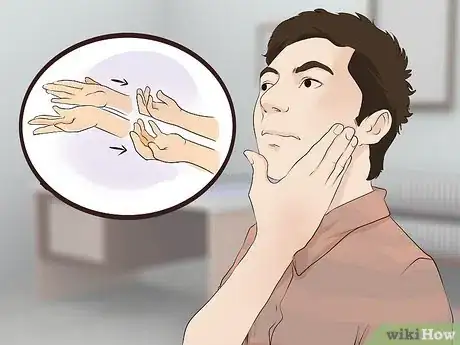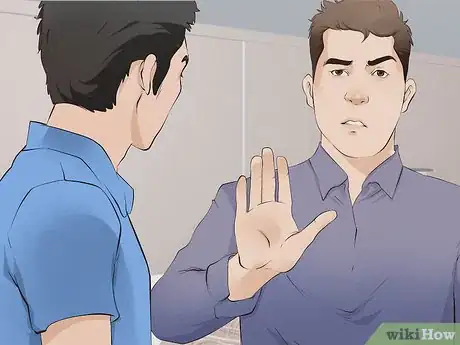This article was co-authored by Adam Dorsay, PsyD. Dr. Adam Dorsay is a licensed psychologist in private practice in San Jose, CA, and the co-creator of Project Reciprocity, an international program at Facebook's Headquarters, and a consultant with Digital Ocean’s Safety Team. He specializes in assisting high-achieving adults with relationship issues, stress reduction, anxiety, and attaining more happiness in their lives. In 2016 he gave a well-watched TEDx talk about men and emotions. Dr. Dorsay has a M.A. in Counseling from Santa Clara University and received his doctorate in Clinical Psychology in 2008.
There are 9 references cited in this article, which can be found at the bottom of the page.
wikiHow marks an article as reader-approved once it receives enough positive feedback. This article has 13 testimonials from our readers, earning it our reader-approved status.
This article has been viewed 664,185 times.
Sometimes, enough is enough. If you feel like you really need a break from emotional pain (or, just from other people), you might decide that you'd like to create some distance from your circle for a while. Though down the line, you'll probably feel better when you open yourself back up to connection, it can be helpful to give yourself some space in the short term—and luckily, it's easier to do than you'd think. We're going to walk you through everything you need to know; read on for more.
Steps
Acting Heartless to Avoid Emotional Pain
-
1Let go of your past emotions. The term “emotional debt” is often used to describe emotions that we have never fully healed from and allow to play out repeatedly in our day to day lives. You should be honest with yourself about any past emotions that are still lingering, consciously breaking the patterns that you have developed as a response to those emotions, and step outside your comfort zone. This will allow you to be aware of how past emotions influence you and to move past them.[1]
- You might think that your comfort zone protects you from bad feelings, but by staying there, you are letting those unpleasant emotions hold you back. When you step outside of it, you can take control over them.
-
2Avoid setting specific expectations. When some experience or person falls short of the expectations you place on them, it hurts. Remove as many expectations as you can from your life, and when you do make an expectation, keep it as broad and undefined as possible. This stops you from subjecting yourself to emotional pain for everything that doesn’t go exactly how you’d like it to.
- You can also change your expectations to be more realistic. For example, you expecting that today will be warm is much less likely to disappoint than expecting that today will be exactly 73 degrees Fahrenheit, breezy, and sunny.
Advertisement -
3Keep yourself busy. Keeping busy is shown to improve contentment. Deliberately choose activities that drive you toward your goals or somehow benefit you. Offering yourself incentives will help justify staying busy.[2]
- It also allows you to pour your energy into work, working out, cleaning your house, etc., rather than seeking out emotional ties.
-
4Keep relationships on your terms. Avoid letting people get too close or control you with promises, pleas, or apologies. Define the types of relationships you want to be in, and have only those relationships. Be in control of how invested you are in any given relationship.
- Having high-quality friendships is more important than having lots of friends.[3]
-
5Seek professional therapy. If you are overwhelmed by past traumas and cannot seem to let the emotion go, you may need the help of a professional psychologist. Issues like chronic depression or anxiety should not be ignored. Your therapist can help you decide what clinical approaches and/or medications might be appropriate to help you move past your emotional debt.[4]
Acting Heartless to Stop Being Used and Get Ahead
-
1Know what you want. It is likely that you already know what you don’t want in your life. What you need to do next is identify your preferences, and then pinpoint exactly what you do want in life. The more clear you desires without reservation, the more effectively you can work toward them.[5]
- If you know what you want, it is harder for others to convince you to do their bidding. This is crucial both to generating your own success and to stop having your time and energy used by someone else.
- Sometimes guilt and stress can cause you to work against what you desire. Knowing what you want will make you stronger when facing these difficult situations.
-
2Communicate your desires. Once you know exactly what you want, it is likely that you’ll have to delegate some things to other people. Communicate exactly what you want and expect to those around you. Do not compromise on your desires.[6]
- You might have to trade some of your time and talent to get another person to do what you need, but set boundaries and do not let the other person use your desires against you.
-
3Say “No” to anything that doesn’t benefit you. When you agree to do things that will not benefit your goals, you are wasting time. Do not give your time away. Time is very valuable, don't let others that don't mean anything take it. Engage only in activities that further your personal goals, and politely decline any other requests or invitations.
- Be direct. Say “No, I cannot (or will not) do that.” If you prefer to add an explanation, such as “I don’t have the time to commit,” that is okay, but not necessary.[7]
- This can be difficult when are being guilted. Things like charities that you do not support, friends that want your help, and even family that demands too much of your time can be serious hurdles to your success. Say “No.”
-
4Consider cooperating with others. Whether you are speaking for yourself or your company, organization, community, etc., it is often hard to accept the fact that you can benefit by working with other human beings, but it’s true. Cooperating with others can be a healthier and more effective way to reach your goals. Make sure that the relationship remains mutually beneficial and that neither party is being used.[8]
- Relationships go two ways. When you are working with other people, make sure you give as much as you take. This will help you build stronger professional and social relationships.
-
5Contemplate the motives of other people. You will often be asked for help in some way. You should understand why you are being asked and what the other person hopes to gain from asking. Understand why someone wants something from you, and then you can decide if it benefits you in such a way that you’d be willing to do it.
Acting Heartless to Avoid People
-
1Avoid small talk. Technology has made avoiding small talk easier than ever. Pretend to take a call, or make it a point to always have headphones in to prevent strangers and acquaintances from engaging. You can also cut the conversation short at anytime with some variation of “I’m too busy to talk.”
- For example, if your co-worker meets you at the snack machine, just cut them off with a quick line like “Can’t talk. I have a deadline.”
-
2Decline invitations to social gatherings. There is no need to be offensive when you decline. You should, however, make your decision firm and final. If you make up a flimsy excuse as to why you can’t attend, the host/hostess is likely to accommodate you and insist you come.[9]
- A great way to avoid nearly any event is to say something to the effect of “I’m sorry. I already have other plans.”
- You do not have to explain yourself if you decline an invitation. You can simply say, "I'm sorry, but I can't make it."
-
3Refuse to do favors. Favors sometimes feel like chores that you must do. Instead, make saying “No” an option and say it confidently. Again, you do not need to be rude to get your point across.
- If your friend asks you to house-sit, simply say “I’m sorry. That doesn’t work for me.” You can offer an explanation if you’d like, but there is no need for excuses.
-
4Consider building a new support system. If you feel like your friends and family are a problem, it might be healthier to build a new support system than to cut yourself off from people. Try meeting new people with similar interests to your own. Look for people who hang out in the same places, work in the same field, or generally like the same things as you do.
Expert Q&A
-
QuestionHow can I control my emotions?
 Paul Chernyak, LPCPaul Chernyak is a Licensed Professional Counselor in Chicago. He graduated from the American School of Professional Psychology in 2011.
Paul Chernyak, LPCPaul Chernyak is a Licensed Professional Counselor in Chicago. He graduated from the American School of Professional Psychology in 2011.
Licensed Professional Counselor Learn to feel and observe them fully without numbing them out. Have a curious attitude without becoming attached to them. Realize that your emotions are not you and are temporary. Try meditation as well.
Learn to feel and observe them fully without numbing them out. Have a curious attitude without becoming attached to them. Realize that your emotions are not you and are temporary. Try meditation as well. -
QuestionHow do I kill my emotions?
 Paul Chernyak, LPCPaul Chernyak is a Licensed Professional Counselor in Chicago. He graduated from the American School of Professional Psychology in 2011.
Paul Chernyak, LPCPaul Chernyak is a Licensed Professional Counselor in Chicago. He graduated from the American School of Professional Psychology in 2011.
Licensed Professional Counselor You cannot kill your emotions. They will always be there and numbing them will only create greater mental and physical problems in the future. Learn to control your emotions or feel them fully without getting attached.
You cannot kill your emotions. They will always be there and numbing them will only create greater mental and physical problems in the future. Learn to control your emotions or feel them fully without getting attached.
Warnings
- Be prepared for others to treat you cold.⧼thumbs_response⧽
- Some people may not like that you have become heartless toward them.⧼thumbs_response⧽
References
- ↑ https://positivepsychology.com/self-acceptance/
- ↑ https://www.latrobe.edu.au/mylatrobe/20-ways-to-keep-yourself-busy-during-self-isolation/
- ↑ Adam Dorsay, PsyD. Licensed Psychologist & TEDx Speaker. Expert Interview. 11 April 2019.
- ↑ https://www.helpguide.org/articles/mental-health/finding-a-therapist-who-can-help-you-heal.htm
- ↑ https://www.psychologytoday.com/us/blog/living-forward/201909/how-figure-out-what-you-want-in-life
- ↑ https://au.reachout.com/articles/3-steps-to-better-communication
- ↑ https://www.scienceofpeople.com/how-to-say-no/
- ↑ https://positivepsychology.com/goal-setting/
- ↑ https://greatergood.berkeley.edu/article/item/21_ways_to_give_good_no
About This Article
While it's not possible to become totally heartless, there are ways to manage your emotions if you're struggling with emotional pain. Try not to ignore unpleasant emotions from your past that still affect you, since they will pass naturally once you accept them. For example, if you’re still angry at your ex for cheating on you, recognize that this is a natural feeling instead of wishing it would go away. Focus your attention on your work and hobbies, which will keep you busy while you heal. You should also try to avoid setting expectations for the future, since this can easily lead to negative emotions. For example, don’t expect friends, family, and romantic partners to make you happy, since you never know what will happen. For more tips from our co-author, including how to avoid negative people who bring you down, read on!










































































